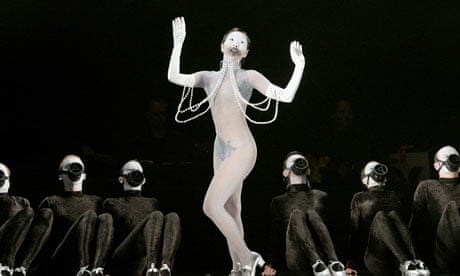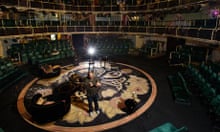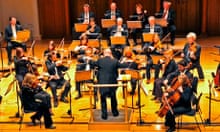Richard Eyre: director
What Arts Council England has done seems quite smart. Equal misery for all would have been deplorable, and lazy. Instead, they've applied the more substantial cuts to the larger organisations, which have a better chance of raising funding through other means. The National theatre, for instance, has been cut by 15%: I imagine that's roughly what they were expecting, and they can pull in sponsorship to make up the shortfall.
ACE has been intelligent in deciding which organsations should receive increases, or be brought into the new portfolio of funded companies; ACE has thoughtfully applied criteria based around talent and risk-taking. The Barbican and the Arcola in London are deserved recipients of their rises [of 108% and 82% respectively]. But I don't understand the decision to reduce funding for the Almeida [by 39%]. It may be that ACE has decided, with hindsight, that the theatre has been over-funded. But I'd be surprised: I've worked there, and I've never seen much money sloshing around.
But the long-term implications of today's decisions are severe. For ACE to use up its reserves (who knew it had reserves?) is extremely worrying. And an increased reliance on lottery funding is the government abdicating responsibility. The government must take its funding of the arts seriously. To fail to do so is incredibly short-sighted.
Matthew Slotover: co-founder of Frieze art fair
I think the arts ministers understand the importance of the arts and are very supportive. Ed Vaizey has been at everything for the last two years – that's as important as the money because it encourages businesses to give, and everyone feels that support.
Overall, I think it's madness to cut the arts at all. Visual arts has been such a massive success story for the last 20 years and where before there was little interest, now it's incredibly mainstream, and I think that should be rewarded. That said, the news for South London Gallery [up 107%] – of which I'm chair – is fantastic. We had very low costs, but have doubled the size of the gallery and tripled our audiences in the last year. And this is in Peckham, a poor area where it's very difficult to get private sponsorship.
The big news, though, is the ICA. Its cut [42%] is a real shame, considering it has a new director and a new chair – everyone in visual arts feels there's a new energy there. This will make their job so much more difficult and there will have to be a lot more reliance on the private sector.
Peter Maxwell Davies: composer
I would accept the need for cuts if I felt they were also being reflected in the salaries of the fat cats and bankers who got us into this mess. But instead, as in all western so-called democracies, culture is always the first thing to go. It's seen as decorative, unimportant, rather than vital to the health of the nation. Without culture, we are impoverished; it makes one despair.
I'm worried about the cuts to several orchestras [of between 11 and 15%]. We're already under-provided for – in countries such as Germany and France, almost every town has its own symphony orchestra. Here, we depend on orchestras such as the London Philharmonic and the London Symphony to tour to areas that otherwise wouldn't have access to classical music. Their ability to do this could be affected.
The cuts to English National Opera [10%] and the Royal Opera House [15%] could have a positive effect, though: it could make them spend less on extravagant sets and costumes and more on the quality of the music. But I respect the fact that ENO has done such a lot in recent years to open its doors to wider audiences. I hope it will be able to continue to do so.
David Peace: novelist
In time, it may become clear what the rationale behind ACE's funding decisions was – but it's difficult to see it now. One company I've worked with a lot, New Writing North, has had its funding increased by 50% – but Red Ladder, a Leeds-based company I've also worked with, has had a 30% cut. ACE's chief executive Alan Davey has admitted that many good organisations have lost out – but that, to me, is an abdication of responsibility. I don't know why they couldn't have made 15% cuts across the board – that would have been fairer.
But then ACE have had a thankless job, and it's no good shooting the messenger – we should shoot the coalition. As far as I'm concerned, this government has no mandate – nobody in this country voted for a coalition, and here they are persuading us that the deficit is such that they need to make massive cuts across the board.
Of all the cuts, those to libraries and the arts are particularly heartbreaking. It's in places such as libraries and theatres that people learn to think of new ideas, and to dream of different ways of living.
Sam West: actor
It's important to say that ACE seem to have been fair and open about their decision-making in an impossible situation. Unlike other sectors facing cuts in government spending, ACE gave the organisations they support a lot of notice. They didn't do that when they announced cuts in 2007, but they seem to have got their act together. I wouldn't blame ACE for anything.
The impact of the cuts will be felt most keenly by people in rural areas. In Somerset, for instance, local council funding for the arts has already been cut by 100% – and now we see cuts in ACE funding for the Northcott theatre in Exeter and the Brewhouse in Taunton. That's basically giving the people of Somerset the message that the arts aren't for them.
I'm very sad to see that Shared Experience and the Riverside Studios have seen cuts – they do really good work. But it is great to see companies such as Shunt, Gecko and Propeller recognised, and brought into the portfolio – though we should remember that the sums of money we're talking about are still very small.
I find it difficult to see the cuts made to ACE by the DCMS as anything other than ideologically motivated. The Conservatives are frightened of anything that educates and enlightens people – such as theatre. They want to preserve the social distinctions that exist between the rich and poor.
Jude Kelly: artistic director, Southbank Centre
We've taken a cut of 6.6% over three years, but I actually see this as a vote of confidence. We could have seen a much more swingeing cut. It would have been unacceptable for the larger organisations like us to remain uncut, while smaller companies took the hit.
I believe the decisions about which organisations to bring into the national portfolio have been made intelligently, which is a great relief. Companies such as Punchdrunk, Streetwise Opera, Gecko and DanceEast are all brilliant examples of innovation and talent. But other good organisations, such as the Cholmondeleys & the Featherstonehaughs dance company, have been cut hugely. It's also a shame to see funding cut for English National Ballet – the big challenge for them, and for other touring companies, is to look at how to tour classical work while keeping it fresh. But I'm relatively cheered by the picture I'm getting of the arts ecosystem: I'm not hearing from anyone that they won't survive.
The increased reliance on lottery funding is, for me, a good thing. It was set up in part to provide money for our cultural life. That relationship has been defused over the past few years, so it's good to see it re-established.
Paulette Randall: director
It's a horrible day. I knew that companies were going to go, but Nitro, one of the historic black companies, getting a total cut is a huge shock.
I think my biggest worry is that if the grassroots are cut, it's really difficult for people of colour to get into the main playing areas of the arts. ACE has done well to invest in the Arcola because it has a new space and has been doing innovative work. ACE probably feel the Almeida can get good funding support privately – but it shouldn't be penalised for having a good fundraising team. You still have to work bloody hard at it.
As a freelance director, it's terrifying, because you can understand why people will keep things in-house. I don't know any of these new organisations but I'm thrilled there is new blood. Without it, we can get too incestuous and stale. Generating voices and ideas – that's what matters.
Stephen Poliakoff: playwright, director and screenwriter
It's good to see theatres such as the Arcola getting an increase in funding. But that's like talking about the extinction of animals and saying: "Oh, well, it's OK because the grey squirrel is doing well." That's not the point. We shouldn't be allowing any of these companies to become extinct.
I have no idea what criteria ACE has applied in making these decisions. You take money away from a small theatre in, say, Northumberland, and you could ruin the entire career of someone who could potentially be brilliant. I owe my career to the Bush theatre [in London], which staged three of my plays when I was 21. If just two or three theatres like the Bush can't afford to stage as many new plays, that's a raft of playwrights whose careers could be snuffed out.
The fact that cuts are being made to the arts at all is hugely counter-productive. The point of the coalition making these cuts is to balance the economy – but the arts are an industry that generates money, so to cut it is bonkers. And we're talking about such tiny sums of public money. I'm not suggesting that people in the government are philistines – Nick Clegg once wanted to be an actor. But the idea that these cuts are being made for economic reasons is just laughable.
Simon Callow: actor
I'm utterly bewildered by the way the cuts have been applied. Some companies have suffered huge losses – Dance Umbrella has been cut by 50%, and they do sterling work. And I can't begin to understand why the Almeida has been cut by 39%: their work is consistently excellent, with every production getting four or five stars. All the London orchestras appear to have been cut by 10%. I can't imagine what the reasoning is behind that. Then there are the organisations who've been given rises, apparently at random. I don't know what Punchdrunk has done to deserve an increase of 141%. And is the Walk the Plank theatre company really the most important thing to invest in at a time like this?
Of course, the cuts could have been worse. But to a theatre company, a cut of 10 or 15% is potentially devastating. The RSC, for instance, has been cut by 15%. The amount they pay actors and crew is already low – so if this means cutting pay by even more, it would be ghastly. What ACE doesn't seem to understand is that the theatre world is a continuum – it's not about the large organisations working separately from the small ones. [Director] Tom Morris is an excellent example. He started out at the Battersea Arts Centre and went to the National, where he created War Horse, which has ended up being one of their biggest money-spinners.
ACE have said they didn't want to practice "salami slicing". Well I think that's exactly what they should have done. They've ended up fatally wounding many companies.
Rupert Goold: artistic director, Headlong
My biggest worry is about supporting the new people coming through. Our funding is at a standstill, which we're grateful for, but we had to stop working on an emerging-directors project last year and there is a fear that the gateway to the industry is narrowed.
I also think excellence should be rewarded. I don't mean five-star reviews, but the organisations that show they are in an vibrant and exciting dialogue with an audience, and that audience is developing and growing. That can be done in rural touring on the back of a bus, or at the Olivier theatre: it's not about scale, it's about leadership and advocacy. No board of any company is going to claim they are anything less than dynamic, but it's important ACE is making the right decisions about who it's moving forward. And yes, the arts can't be exempt from a bit of pruning, and we all accept a tightening of belts. What is really unclear is what the government's future plans are. If the economy bounces back, will it plough that money back in? We've had mixed messages on that. If it does, then this period could be a really important one for green shoots to develop. If it doesn't, it will be really, really bleak.
David Hare: playwright
What's happening to culture is what's happening elsewhere. The government is crewed by a galley of suck-ups hoping to catch the leader's eye with the daring of their plans. The Film Council was abolished, then before a week had passed, its assassins were privately admitting they had made a mistake. Next came the forests, hastily reclaimed for the public. Now, we are told, warships are to be built and mothballed before they ever leave the dock. But for some theatres, it will be too late. They will close. As always with Cameron's coalition, you can only pray that its incompetence will finally mitigate its spite.







Comments (…)
Sign in or create your Guardian account to join the discussion